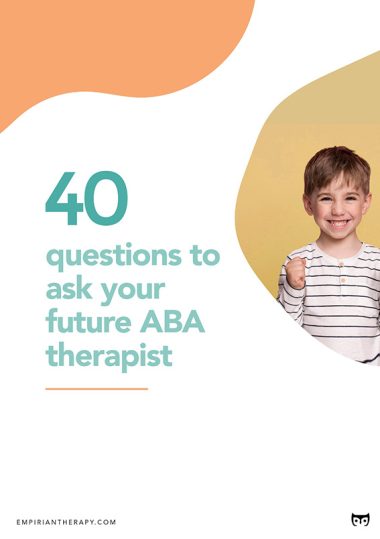As many are aware, one of the demographics that commonly seeks out ABA therapy is parents of children who have been diagnosed with autism.
While ABA is used for all kinds of people dealing with all kinds of challenges, people with autism and other developmental or intellectual disabilities continue to benefit greatly from it. In fact, it was these kinds of challenges that ABA was originally developed and used for.
ABA is a behavior-based therapy that solves real-life problems of social importance. Behavior analysts observe, take data and analyze the circumstances leading up to and following a behavior, and make changes in those circumstances in the hopes of ultimately changing the behavior as a result.
This can mean increasing helpful behaviors, or decreasing harmful, unhelpful or challenging behaviors. ABA therapists continually take data to determine if the desired behavior change has been achieved, and make adjustments based on the data analysis.
For more info, see our article What is ABA, Really?.
Today, over 70% of behavior analysts and therapists work with autistic people—and in all 50 states in the US, insurance companies are required to cover ABA for autism.
ABA uses the same principles of behavior to help autistic people learn to live in a non-autistic world. It teaches them skills that are essential for functioning at home, school and in the community. It can also help decrease problem behaviors that are dangerous or harmful, or ones that limit social, educational, vocational or other opportunities.
ABA therapy can be used to help people of all ages, not just children—although gains are greater with early intervention. It can be used across the spectrum of abilities, regardless of the individual’s support needs.
The very first study that used behavior analysis to treat children with autism was in 1961. Since then, over five decades of research have shown that ABA therapy for autistic people is the most successful therapy out there—and there is more scientific evidence that ABA is effective for people with autism than any other treatment.
ABA therapy is safe and effective. A number of governmental and public health organizations have endorsed ABA for autism, including the American Academy of Pediatrics, National Autism Center, National Institute of Mental Health (NIMH) and US Surgeon General.
So why exactly is ABA so effective in teaching people with autism?
- Due to differences in brain structure, people with autism have difficulty processing complex motor tasks. ABA breaks down tasks and complicated skills into small, easier-to-learn steps.
- Many people with autism have difficulty learning spontaneously from the natural environment the way their neurotypical peers do. Discrete Trial Training, the most commonly known and often-used ABA teaching method, uses a highly structured approach to teaching skills. Once the skills are successfully learned in the structured environment, they are then practiced in the individual’s natural environment until they can successfully complete them there as well. See our articles A Peek into an ABA Session and Maintenance & Generalization for more information.
- ABA is highly individualized. No two people with autism are alike, so no two ABA therapy programs are the same. Behavior analysts assess the learner’s skill repertoire and behaviors in order to determine, together with the parents (and the child if they are able to give input), what should be addressed.
What skills are taught using ABA?
Most skills taught fall under the domains of communication, social, and self-care/activities of daily living (ADL). There’s also an entire subset of ABA that focuses on verbal behavior, and non-vocal individuals are taught to use signs, pictures or assistive technology to communicate.
Community skills, independent living, pre-vocational and vocational skills, school readiness skills and play/leisure skills can also be taught using ABA.
If you think there is an aspect of your life that could benefit from ABA therapy, please don’t hesitate to reach out to the Empirian team for more information or to discuss how we may be able to help. Change is possible—but only once you take the first step!


